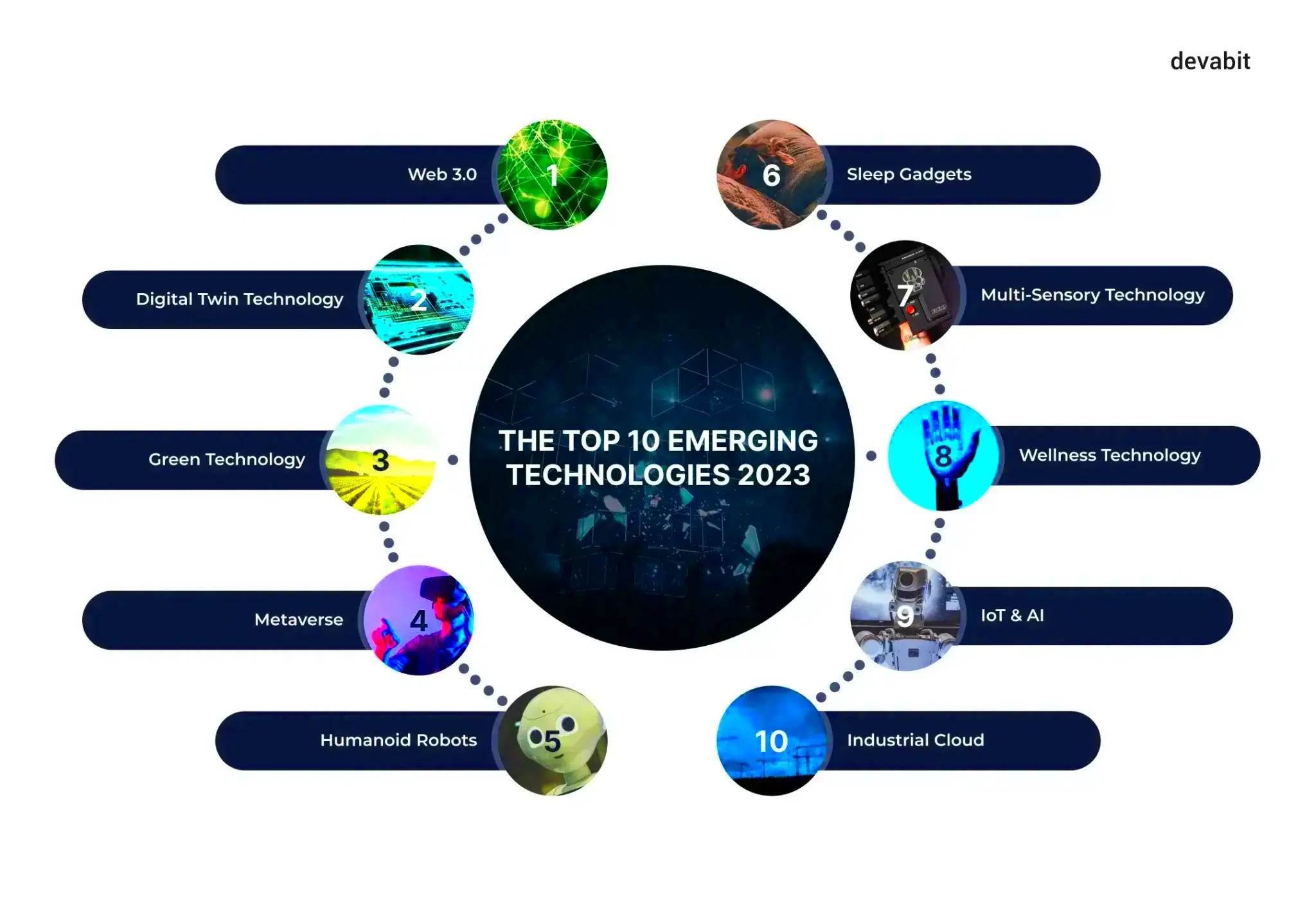Emerging technologies are reshaping our world in ways we never imagined. These advancements include artificial intelligence, blockchain, and the Internet of Things (IoT). They influence how we work, communicate, and even live our daily lives. By understanding these technologies, we can better grasp their potential and the opportunities they present for our careers.As these technologies evolve, they create new job roles and industries. They can lead to increased efficiency, innovation, and even address complex global challenges. It's important to stay informed about these changes and consider how they might impact your career path.
Overview of Prominent Careers in Emerging Technologies

The rise of emerging technologies has opened up a variety of career paths. Here are some prominent careers you might consider:
- Software Developers: They create applications and systems using programming languages.
- Data Scientists: They analyze and interpret complex data to help organizations make informed decisions.
- Cybersecurity Experts: They protect systems and networks from cyber threats.
- Cloud Engineers: They design and manage cloud-based systems and services.
- AI/Machine Learning Engineers: They develop algorithms that enable machines to learn and improve from experience.
These careers require a mix of technical skills, creativity, and problem-solving abilities. The demand for professionals in these fields is expected to grow, making them attractive options for those entering the job market.
Artificial Intelligence and Machine Learning Opportunities

Artificial Intelligence (AI) and Machine Learning (ML) are among the most exciting fields in
technology today. They involve creating systems that can perform tasks that usually require human intelligence, such as understanding language, recognizing patterns, and making decisions.Here are some career opportunities in AI and ML:
- Machine Learning Engineer: Focuses on designing algorithms that allow machines to learn from data.
- Data Analyst: Examines data to extract meaningful insights and supports decision-making processes.
- AI Research Scientist: Conducts experiments to advance the understanding of AI and develops new applications.
- Natural Language Processing (NLP) Engineer: Specializes in enabling machines to understand and respond to human language.
The skills needed for these roles often include programming languages like Python, a solid understanding of algorithms, and experience with data manipulation. Professionals in AI and ML enjoy high salaries and are at the forefront of technological innovation.
Cybersecurity Roles in Today’s Digital Age

In our increasingly digital world, cybersecurity has become more critical than ever. As businesses and individuals rely on
technology, the risk of cyber threats grows. Cybersecurity professionals work to protect sensitive data and maintain the integrity of systems. If you have a passion for
technology and a keen eye for detail, a career in cybersecurity might be for you.Here are some key roles within the cybersecurity field:
- Security Analyst: They monitor networks for security breaches and respond to incidents.
- Penetration Tester: These experts simulate cyberattacks to identify vulnerabilities in systems.
- Security Engineer: They design and implement security measures to protect IT infrastructure.
- Chief Information Security Officer (CISO): A senior executive responsible for an organization's overall security strategy.
These roles require a combination of technical knowledge and problem-solving skills. Many positions also demand certifications, such as Certified Information Systems Security Professional (CISSP) or Certified Ethical Hacker (CEH). The demand for cybersecurity professionals continues to rise, making it a stable and rewarding career choice.
Exploring Careers in Data Science and Analytics
Data is often referred to as the "new oil," and for a good reason. In today’s data-driven world, the ability to analyze and interpret data is a valuable skill. Data science and analytics involve extracting insights from large sets of data to inform business decisions and strategies. If you enjoy working with numbers and have a knack for storytelling through data, this field may be for you.Some prominent career paths in data science and analytics include:
- Data Scientist: They develop models and algorithms to analyze complex data.
- Data Analyst: These professionals focus on interpreting data trends and creating visualizations.
- Business Intelligence (BI) Analyst: They analyze data to provide actionable insights for improving business performance.
- Data Engineer: They build and maintain the systems that allow data collection and processing.
Skills needed in this field typically include proficiency in programming languages like Python or R, statistical analysis, and experience with data visualization tools. As businesses increasingly rely on data-driven insights, the demand for skilled data professionals continues to grow.
Job Opportunities in Cloud Computing
Cloud computing has transformed how organizations store and access data. Instead of relying on local servers, businesses now utilize cloud services to enhance flexibility and efficiency. As a result, the need for cloud computing professionals has skyrocketed. If you’re interested in working with innovative technologies and helping businesses transition to the cloud, this field offers plenty of exciting career opportunities.Key roles in cloud computing include:
- Cloud Architect: They design cloud solutions that meet an organization's needs and ensure they are scalable and secure.
- Cloud Engineer: Responsible for implementing and managing cloud services and infrastructure.
- Cloud Consultant: They help businesses adopt cloud solutions by assessing their needs and providing strategic advice.
- DevOps Engineer: Focuses on the integration of development and operations to improve the deployment process in cloud environments.
These roles require skills in cloud platforms like Amazon Web Services (AWS), Microsoft Azure, or Google Cloud. Professionals in this field enjoy competitive salaries and the opportunity to work on cutting-edge
technology, making cloud computing a dynamic career choice.
Importance of Continuous Learning in Tech Careers
In the fast-paced world of
technology, continuous learning is not just beneficial; it’s essential. As new tools, frameworks, and methodologies emerge, professionals must adapt to stay relevant in their fields. Whether you're just starting or have years of experience, embracing a mindset of lifelong learning can help you thrive in your tech career.Here are a few reasons why continuous learning is crucial in tech:
- Rapid Industry Changes: Technology evolves quickly, and what was cutting-edge a year ago may be outdated today. Keeping your skills updated ensures you remain competitive.
- Enhanced Problem-Solving Skills: Learning new concepts and techniques can improve your ability to tackle complex problems effectively.
- Career Advancement: Employers value employees who take the initiative to learn. Continuous education can lead to promotions and new job opportunities.
- Networking Opportunities: Engaging in learning platforms, workshops, or conferences allows you to connect with industry professionals and expand your network.
Many resources are available for continuous learning, including online courses, webinars, podcasts, and industry conferences. Whether you choose to learn on your own or through formal education, staying curious and committed to growth will serve you well in your tech career.
Frequently Asked Questions
As you explore careers in emerging technologies, you may have some questions. Here are answers to a few common inquiries:
What qualifications do I need to enter a tech career?
- While a degree in a relevant field can help, many positions value skills and experience over formal education. Certifications and practical projects can also boost your resume.
Is prior experience necessary for tech jobs?
- Not necessarily. Entry-level positions often exist for those willing to learn. Internships and volunteer projects can provide valuable experience.
How can I stay updated on industry trends?
- Following tech news websites, joining professional groups on social media, and attending workshops are great ways to stay informed.
Are remote tech jobs available?
- Absolutely! The tech industry offers many remote opportunities, allowing you to work from anywhere.
Conclusion on Careers in Emerging Technologies
Careers in emerging technologies offer exciting opportunities for growth and innovation. As industries continue to evolve, the demand for skilled professionals will only increase. Whether you're interested in artificial intelligence, cybersecurity, data science, or cloud computing, there’s a place for you in this dynamic landscape.By embracing continuous learning and staying adaptable, you can navigate this ever-changing field. Remember, every expert was once a beginner, and with the right mindset, you can carve out a successful career in
technology. Explore your options, seek out resources, and don't hesitate to take the first step toward your future in tech!
 The rise of emerging technologies has opened up a variety of career paths. Here are some prominent careers you might consider:
The rise of emerging technologies has opened up a variety of career paths. Here are some prominent careers you might consider: Artificial Intelligence (AI) and Machine Learning (ML) are among the most exciting fields in technology today. They involve creating systems that can perform tasks that usually require human intelligence, such as understanding language, recognizing patterns, and making decisions.Here are some career opportunities in AI and ML:
Artificial Intelligence (AI) and Machine Learning (ML) are among the most exciting fields in technology today. They involve creating systems that can perform tasks that usually require human intelligence, such as understanding language, recognizing patterns, and making decisions.Here are some career opportunities in AI and ML: In our increasingly digital world, cybersecurity has become more critical than ever. As businesses and individuals rely on technology, the risk of cyber threats grows. Cybersecurity professionals work to protect sensitive data and maintain the integrity of systems. If you have a passion for technology and a keen eye for detail, a career in cybersecurity might be for you.Here are some key roles within the cybersecurity field:
In our increasingly digital world, cybersecurity has become more critical than ever. As businesses and individuals rely on technology, the risk of cyber threats grows. Cybersecurity professionals work to protect sensitive data and maintain the integrity of systems. If you have a passion for technology and a keen eye for detail, a career in cybersecurity might be for you.Here are some key roles within the cybersecurity field:
 admin
admin








